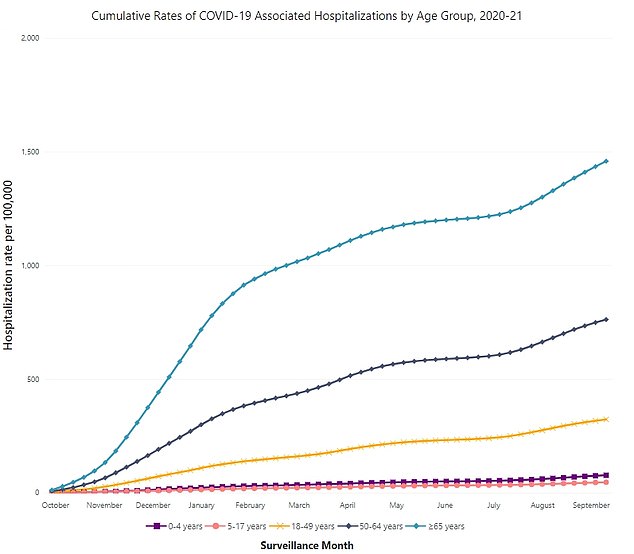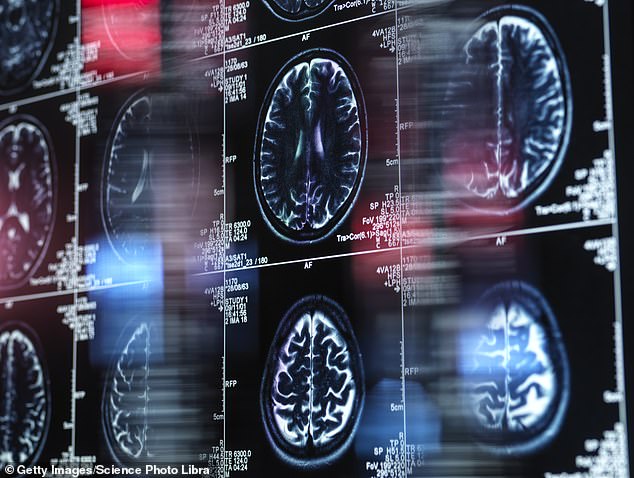A new study has fueled concerns that the United States could face a rise in dementia in the coming years and decades due to COVID.
Nearly two-thirds of people over 65 who were hospitalized with the virus were found to have mild cognitive impairment, which can be a precursor to dementia.
Independent experts told DailyMail.com that this is a trend they are closely monitoring, as if there is a link, it could start affecting the millions of older adults infected with the virus in the near future. But the new study stops short of concluding that the two are linked, experts warn.
CDC data shows this age group accounted for 47 percent of all hospitalizations between 2020 and 2021, or about 1,701,300 people.
The study looked at people over the age of 65 who were hospitalized with COVID-19 in 2020. This means the study population was very sick and it’s hard to say how people with less severe illness might be affected.

Data from the CDC’s COVID-Net lab showed the cumulative number of COVID hospitalizations between 2021 and 2022. Studies have estimated that approximately 1,701,300 people aged 65 and older were hospitalized this year.
Researchers at the University of New South Wales came to these conclusions in their study after reviewing 18 previous studies, which included some 412,900 participants hospitalized with COVID-19 and 411,900 healthy participants, both groups over 65 years of age.
The study was published as a preprint, meaning it still needs to be reviewed by other scientists, in the journal Reviews of research on aging.
About 65 percent of those with the virus had some degree of mild cognitive impairment, a brain fog-like state that can sometimes be a precursor to dementia.
Researchers aren’t sure why COVID might be causing these brain changes, but they theorize it could have to do with inflammation or changes in blood flow, Dr. Vin Gupta, a pulmonologist and public health physician who was not involved in the research, told DailyMail.com.
However, Dr Gupta and other independent experts have also expressed concerns about the study.and other factors that increase the risk of dementia, such as high blood pressure, heart disease and obesity, could not be ruled out.
“This is another study that is directional and adds some additional insights into what might be happening with COVID and its impacts on human organ function, but I think it’s far from definitive,” he said.
Dr. Eve Elizabeth PennieA general practitioner and Drugwatch medical contributor who was not involved in the research, told DailyMail.com that he found similar weaknesses in the study.
However, this adds more evidence to a trend that public health experts have been observing.
“Given the growing evidence from similar studies, the findings are compelling and somewhat expected,” Dr. Pennie said.
No previous studies have concluded that COVID-19 causes dementia, but multiple previous studies have shown there may be a link between the two, Dr. Gupta said.
Many diseases have side effects, such as chickenpox and shingles. So it is reasonable to suspect that this virus could have some side effects, experts say.
In previous outbreaks of similar viruses, such as SARS in 2003 and MERS in 2012, researchers observed that cognitive decline was a side effect.
COVID-19 causes a range of changes throughout the body, including increased inflammation and changes in blood pressure and clotting, which can lead to changes in the brain, the study authors wrote.
Additionally, in rare cases, COVID-19 can also cause more serious neurological problems. Conditions such as encephalitisa swelling of brain tissue that kills or damages swaths of neurons.
It’s not clear how COVID-19 might be directly linked to dementia. The study’s authors suggest that the virus may increase the amount of beta-amyloid, a protein that builds up in the brains of Alzheimer’s patients, in the body.

Several studies have linked dementia to COVID-19, but Dr. Gupta cautioned that finding a link is not the same as proving a cause.
Otherwise, changes in blood flow could cause small, frequent lesions in brain tissue, depriving it of oxygen often enough to cause long-term effects that could lead to dementia. Researchers aren’t yet sure what theory can explain this link, Dr. Gupta said.
Dr. Pennie noted that while these findings are in line with current trends, they come with some important caveats.
First, the study did not control for pre-existing conditions such as high blood pressure, diabetes and heart disease, all common factors in people over 65 that make a person more likely to develop dementia.
Secondly, most of the included studies did not have data from before their patients contracted COVID-19. This means that their cognitive impairment could have existed before they were infected with the virus and it is difficult to know what COVID-19 actually caused them.
In addition, most of the data was collected in 2020, before widespread vaccination, and all patients included had a very severe case of the disease, as they were hospitalized for it.
This makes it impossible to apply what we learned here to today’s general population, which is more likely to be vaccinated and have a less severe case of COVID-19, Dr. Gupta said.
Overall, while it points to some trends, Dr. Gupta said, “It’s a very weak study from a design standpoint.”


